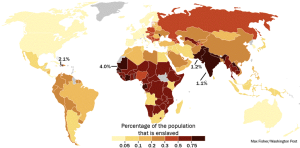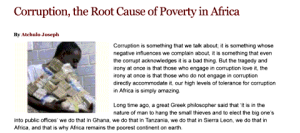 Two weeks ago, I introduced a series of blogs on the rationale for translating the Old Testament into the languages of Africa. As I stated in the introduction, there are a number of good reasons to translate the Old Testament. I am limiting myself to one proposition – that God has revealed himself in the Old Testament in ways that give his comfort, encouragement and instruction for many of the most burning issues facing African Christians, while the New Testament has little to say on those burning issues. Last week, I dealt with the issue of war and conflict. This week, my topic is oppression.
Two weeks ago, I introduced a series of blogs on the rationale for translating the Old Testament into the languages of Africa. As I stated in the introduction, there are a number of good reasons to translate the Old Testament. I am limiting myself to one proposition – that God has revealed himself in the Old Testament in ways that give his comfort, encouragement and instruction for many of the most burning issues facing African Christians, while the New Testament has little to say on those burning issues. Last week, I dealt with the issue of war and conflict. This week, my topic is oppression.
Oppression and corruption are closely related. For my purposes here, I define oppression as a system of corruption or favoritism which prevents people from living in freedom and/or keeps them in poverty. First, we will look at some facts about oppression in Africa, and then we will look very briefly at the way the Old Testament treats the issue.
A web of corrupt activity costs the poor one trillion dollars a year and results in 3.5 million deaths, according to researchers. Perhaps a story would help put those numbers in perspective. When Dayle and I worked in the Democratic Republic of Congo, we met a man teaching fisheries at a University. He told us that he made a field trip with his students to a local lake where there were traditional fishermen. While there, he discovered that some fishermen were fishing in the spawning beds of the lake – a practice that is both illegal and which will eventually result in reduced number of fish threatening their livelihoods. So he raised the issue with the chief in one of the fishing villages. The chief told him that he was concerned and so were all the fishermen from the area, but the men fishing in the spawning beds were not from the area. Attempts to get them to stop did not have any effect, on the contrary, it became clear that those men were protected. No one dared touch them. I told this story to another one of the lecturers at the university who was from that area. He confirmed the story. He said he believed that the men were connected all the way to very high offices in the capital, so that even the Governor of the Province could not stop them.
Here were people who had been fishermen for generations. They knew how to protect their livelihood and make sure its sustainability, but they faced high-level corruption that was ruining them. Not all officials are corrupt, but enough are that the corruption can strangle small businesses and ruin local people.
You might ask how corruption can kill people. Let’s take counterfeit drugs. Criminal manufacturers create knock-offs of drugs like antibiotics that look like the real thing, packaging and all. They contain just enough of the real ingredient that they can fool simple testing. But when people buy them, they are not cured and some die. People living in poverty might spend several weeks wages on drugs for a critically ill family member, not knowing that the drugs are imposters only to have their loved one die. Corruption in ports, customs offices and government medical services facilitates the flow of counterfeit drugs.
Here’s another example of how corruption kills. An audit of the funds sent to Sierra Leonne showed that a full 30% of funds earmarked for fighting Ebola were not accounted for. Funds which should have been spent stopping the spread of Ebola, went into the hands of civil servants, which undoubtedly lead to more deaths.
Every year, the Human Rights report for Congo states that the police and the military commit over 95% of all human rights abuses. In Nigeria, Boko-Haram is killing people, chasing them off their land and bringing farming and small businesses to a halt. Thousands have been killed and many more have had their livelihoods ruined. Responsible people who worked hard for their families and took care of themselves have been forced off their land and into poverty.
 If you take maps of human trafficking (slavery) and corruption and lay them over a map of the places with many languages without the whole Bible, you will see significant correlations.
If you take maps of human trafficking (slavery) and corruption and lay them over a map of the places with many languages without the whole Bible, you will see significant correlations.
All the situations I describe here parallel those described in the Old Testament where religious and government leaders practiced corrupt oppression and ordinary people suffered for it.
The New Testament has some statements about corruption and oppression, but it is the Old Testament that deals with the issue in-depth. There is the poignant story of Naboth who was the victim of a plot by Queen Jezebel who killed him and gave his vineyard to King Ahab. (I Kings 21:1-16) I am sure that those Congolese fishermen would nod their heads with understanding if they were to read that story. The story of Naboth is not the only story of corrupt oppression in the Old Testament.
But the Old Testament has much more than stories of corrupt oppression. It addresses the issue in practical ways:
Corruption makes fools
of sensible people,
and bribes can ruin you.
Ecclesiastes 7:7
More significantly, we find in the Old Testament long passages that deal with corrupt oppression, such as Isaiah 28:7-22, Isaiah 5:8-30, Psalm 73 and pretty much the entire book of Habakkuk. These longer passages deal with corruption and oppression from several angles: how God views such practices, the future God reserves for those doing the oppressing, God’s favor on those being oppressed, the future God reserves for the oppressed, the damage done to people and all of society by corrupt oppression and the emotional pain of seeing oppressors get economic gain from their oppression, among others.
Those suffering under oppression can sometimes assume that they did something to deserve it – they may think that God is punishing them for their sins. This plays into the hands of the oppressors. After all, oppressed people who believe that it is their fault will probably just take their punishment. They are not likely to take a stand for justice.
In the Old Testament, God’s people who live under oppression can know that God is on their side and that staying away from corruption and oppression will eventually be rewarded. Maybe that will give some of them the courage to stand against evil even though it is dangerous. Maybe some will start telling the Old Testament stories of corrupt oppression and spreading the Old Testament perspective on it, and maybe, just maybe, that will result in a more just society for them in the long-term. We have an example in the US civil rights movement which drew heavily from the Old Testament.
That’s an outstanding reason to translate the Old Testament into more languages in places where the levels of corruption and oppression are high.


Hi Ed, Wilma and I are in Corvallis OR at the moment visiting friends and our old stomping grounds. We’re off to see the Winchester’s next Monday. We’re enjoying and looking forward to enjoying more. I want to thank you for these articles on the O.T. I believe as most christians say they do they – ALL Scripture is inspired… and that was written before the N.T. had been complied and in place. To write off the OT as of no/minimal value is sad and twisted perspective. I wonder if the fact that there are those who try to do a good work by distributing New Testaments are unintentionally impacting the intrinsic value and worth of the OT.
Blessings to you and Dayle,
Ken and Wilma
LikeLiked by 1 person
Thank you for the encouragement. Have a great time with the Winchesters.
LikeLike
What a great article, but then your writing is always a blessing. We appreciate these words and are so thankful for the Word of God which blesses us and guides us daily. Praying for you both and your ministry.
LikeLiked by 1 person